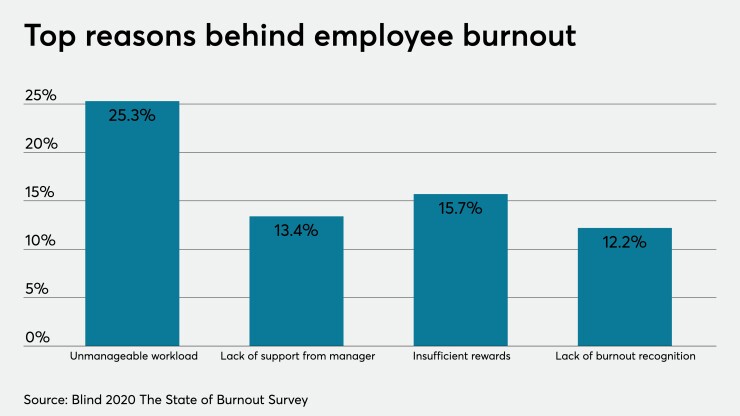As employees struggle with overwhelming workloads,
Forty percent of employees say they feel unrecognized for the work they’ve been doing during the pandemic, according to a report by the Achievers Workforce Institute. A quarter of employees say they plan to
To prevent employee turnover and keep employees engaged and invested in their organizations, managers need to be consistently showing appreciation and empathy for the challenges their workers have been facing, says Dawn Baron, director of marketing at PeopleFluent, a talent management software company.
Read more:

“It's not easy to balance all of what we’re balancing, but this experience has humanized many of us because we have a window into everyone’s personal lives,” she says. “This past year taught us to listen but it’s not always enough. You also have to prove that you heard what was said and that you respect and appreciate it.”
The accessibility of remote work is an opportunity to open the lines of communication. A
“At PeopleFluent, we have a weekly call-out so that the whole entire organization can be made aware of those individuals who were thanked,” Baron says. “Sometimes we don't always have the opportunity to recognize someone for the work that they do in that week. But once you start doing it, people pick up on that and start feeling like they’re being heard and appreciated.”
At the start of the pandemic, organizations rolled out an endless schedule of virtual activities, like Zoom happy hours, trivia nights and other team-building exercises to build connections. While these are all important ways to encourage and reward employees, managers should be conscious of how these well-meaning activities could cause workers even more stress, Baron says.
Read more:
“In the beginning, we thought if we get people together virtually to celebrate or have a mocktail, that would drive people and get them excited,” she says. “But now that feels like it’s taking up more calendar time. Be sensitive about how much time you’re taking up on behalf of others. That’s one way to show respect to your people.”
Employees are clocking in longer hours in their virtual office and with their home responsibilities. Sixty-five percent of working parents say they have started their workday earlier or ended later to make up for time
Read more:
While employers have expressed concerns over the loss of productivity that could come with being outside of the office, almost all employers say they have not noticed a difference in productivity during the pandemic, Mercer found.
However, that comes at a cost to employees: workers have admitted to struggling with
“People who are lonely feel less productive and that their work is lower quality and they’re likely to miss work or leave for another job,” says Dr. Doug Nemecek, chief medical officer for behavioral health at Cigna. “It’s important that we all take time to reach out and talk to one another about things other than work.”
Employers can also utilize social media to recognize good work and keep employees in-the-know as to what decisions are being made and how they’re contributing to those goals.
“When people feel like they know where they are in the business and how the business makes decisions, they feel more confident at work,” Baron says. “If you feel confident and empowered, you don’t always need to be told you’re doing a good job because you’re making decisions that benefit you and the organization.”
The pandemic has drastically altered the way teams work together and this change will likely remain once everyone
“I've always been a believer that tomorrow is always a new day,” Baron says. “If you’re practicing bad behaviors, you have another opportunity tomorrow to start practicing better behaviors that help people along.”






